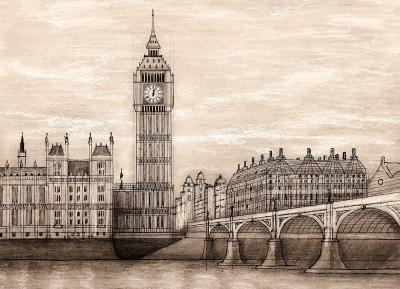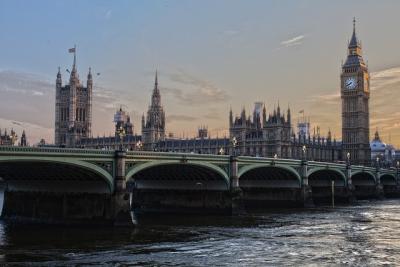Think on British history – Britain, the original land of steam engines. There they are chugging across the countryside, carrying the hard-won produce of the good land, heading to the great market cities of the realm or the global ports of Liverpool or Southampton. And what about the peoples? Complementing the sometimes lofty English in the Union are the sensible Scots and the spirited Welsh (I don’t know what that means, but I believe in it). It’s not a perfect union by any means, but it will remain workable, and keep its eye on improving the lot of the many throughout the nineteenth and into the mid-twentieth century.
Now think of contemporary Britain – all those wonders of iron and culture and progress have been superseded by the shared sense that Britain itself is about to become a pensioner, if it does not die a death of several secessions first.
Not London, mind you, meaning ‘the City of London’ (AKA, the ‘Square Mile’ or ‘Central Business District’), which together with the City of Westminster plus a few tony satellite holdings now operate as if the capital of a wealthy financial-microstate, a Vaduz on the Thames. The Cities have a ring of imported servants (ahem, service workers) flanking them on all sides, unironically called ‘Greater London’. To make London work for the Cities, an enviable public transport system has been designed to communicate everything needful to itself, and within itself. This well-lubed machine hums along no matter the political or meteorological weather.
Meanwhile, in much of the rest of Britain, the arthritis is felt in the joints, the muscles twitch slowly when they twitch at all. Need a train? Might not run. A doctor? Wait a week. An ambulance? Take two Paracetamol and stand by for a few hours. School or university? No teachers. Then there are routine worker shortages in restaurants, hotels, cafes, pubs, and stores.
Not only are the teachers and train personnel striking, all the unions seem to be out in force (and good for them, since wages are low, and the work is often demeaning). But for the rest of us, it seems that there are strikes everywhere, and much of life must again be put on hold. Few solutions seem to be on offer. Only a strike of the United Union of Union Bosses might bring a swift end to this temporary sclerosis.
How do most ordinary Brits respond? They shrug their shoulders, seeming to say that the lack of access to basic modern services is to be expected. They blame either Brexit or ‘the politicians’ or ‘the system’, each of which is understood to be as powerful as a force of nature, and as inscrutable and intractable as the providence of the God they no longer believe in (but still pray to when in a pinch). Their complaint sounds like the resignation of the dying to the fact of their imminent death.
Late in any civilisation things begin to fall apart, to crumble, to come undone. I don’t think that’s precisely what these symptoms indicate (at least in Britain) as the chief underlying dis-ease. British institutional decay is better understood as the final echo of the failed social and political experiments of the twentieth century. Britain is still modelled on their blueprints. But the temporary surpluses that once made fiscally irresponsible choices seem politically necessary are no longer available to plaster over the growing gaps in the foundation. Britain is edging ever closer to becoming a semi-functional polity, a sort of latter-day DDR.
The system designed for a bygone age might just need to run its course before the problems become so acute that they beg for drastic solutions; or for a ‘fresh sheet of paper’ approach to redesigning the British transportation, housing, education, and healthcare systems.
And yet Little Blighty still matters to Europe
Notwithstanding the uncertain future of Britain, since the war in Ukraine began, it has been participating in a geopolitical realignment. I am not the first to notice that the events of the past year are resulting in a change in the moral and political character of Europe. This is true both of the broad European security settlement and the meaning of the European Union itself. The Paris-Berlin celebrity power couple is being replaced by the Warsaw-London dyad. The moral centre of the European Union is moving steadily east, toward Poland and the Baltic states (with Hungary in this respect, becoming less relevant by the day, seemingly by its own design).
The ‘civilisational vision’ that one finds in central and eastern Europe involves the willingness to struggle for and to defend other Europeans (now chiefly Ukrainians), as well as to cherish the historical settlement of Europe as the place not only of the Enlightenment and the Scientific Revolution but also of the Reformation, Renaissance, and the High Middle Ages; as well as the inheritor of the legacies of the Roman Empire, the Christian Church, and Greek philosophy – namely, all that used to be called ‘Christendom’ in its largest and most inclusive sense.
For instance, Poland is one of the most pro-EU countries in Europe according to every poll known to man. But Warsaw is working for an EU that affirms European civilization as handed to us by our forbears rather than as proposed to us by our would-be successors.
As the moral weight has shifted, so has the security centre, which is moving West, toward London. The whinge-ingness of Germany at the threat of Russia, together with the nonchalance of France in the face of its neighbours’ energy and security needs, leaves the smaller lands wondering whether those nations understand anything but national self-interest. For them to be so unconcerned, you would have thought that the war in Ukraine was happening in their former holdings such as Vietnam or Cameroon rather than at the eastern border of the EU.
All the while, in London, the meaning of this war has been felt and understood.
The EU’s executive mistake comes as the long conclusion of forgetting that one has enemies abroad, that human nature does not change just because we have shiny, new ‘European values’, and that humans don’t forget how to fight just because they have running water, national healthcare, and comfortable condoms.
The correct assessment of Russia’s relation to Europe, and the willingness to offer aid of all kinds almost from the get-go, is perhaps the only political position that London got right during 2022. But it might also, and ironically (intentionally?), have been the most important decision securing the EU’s medium-term survival.
Read also
Anglospherical: The Region Report on the Anglosphere - April 2023
As we learnt in the March Region Report on the Anglosphere (LINK), Scotland does not want to be left behind in the race to replace heritage British leaders with those from the former British colonies of Asia.
Vernon Rogers
Ban Billionaires! – Don't tax them, exile them to their yachts
Earlier this month the American president, Mr Joe Biden, proposed a minimum tax of 25% on billionaires. It is unclear whether such a proposal could ever gain traction in the land that invented the billionaire as a special class of modern man.
Vernon Rogers
Anglospherical: The Region Report on the Anglosphere - February 2023
On the 15th of February, the First Minister of Scotland, Mrs Nicola Sturgeon, announced her resignation. The First Minister would be the equivalent of a prime minister if Scotland were independent.












Comments (0)